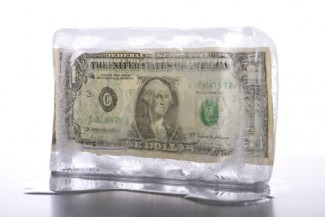Law allowing pretrial freeze on assets untainted by crime violates Sixth Amendment, SCOTUS rules

Image from Shutterstock.
A federal law that allows courts to order pretrial freezes on assets that are untainted by crime violates the Sixth Amendment rights of defendants who are unable to pay their lawyers, the U.S. Supreme Court has ruled in a 5-3 decision.
The court ruled (PDF) Wednesday on behalf of Sila Luis, who was charged with Medicare fraud. The government obtained a pretrial order freezing $2 million in assets in hopes of preserving the money for restitution and penalties. The order was obtained under a law that allows pretrial freezes on assets that are tied to a crime, as well as assets “of equivalent value.”
The “equivalent value” provision is unconstitutional to the extent it prevents the defendant from paying her lawyer, the Supreme Court found.
In a plurality opinion, Justice Stephen G. Breyer distinguished Luis’ case from two 1989 Supreme Court decisions that allowed asset freezes, United States v. Monsanto and Caplin & Drysdale v. United States.
“The relevant difference consists of the fact that the property here is untainted; i.e., it belongs to the defendant, pure and simple,” Breyer wrote. “In this respect it differs from a robber’s loot, a drug seller’s cocaine, a burglar’s tools, or other property associated with the planning, implementing, or concealing of a crime.”
Breyer’s opinion finding a Sixth Amendment violation was joined by three other justices—Chief Justice John G. Roberts Jr., Ruth Bader Ginsburg and Sonia Sotomayor. A concurrence by Justice Clarence Thomas agreed there was a Sixth Amendment violation but said the plurality used an “atextual balancing analysis” in reaching its conclusion.
Justice Anthony M. Kennedy, in a dissent joined by Justice Samuel A. Alito Jr., said the plurality decision ignores precedent. The plurality’s “unprecedented holding rewards criminals who hurry to spend, conceal, or launder stolen property by assuring them that they may use their own funds to pay for an attorney after they have dissipated the proceeds of their crime,” Kennedy wrote.
A separate dissent by Justice Elena Kagan said she agrees prior precedent is controlling, but she finds Monsanto “troubling.” But the correctness of that decision is not at issue, Kagan said, because Luis did not ask the court to overrule or modify it.
Related articles:
ABAJournal.com: “Chemerinsky: New term’s most important cases–so far”
ABAJournal.com: “ABA asks Supreme Court to curtail expansion of forfeiture laws”
ABAJournal.com: “Does freezing defendant’s untainted assets violate right to counsel of choice? SCOTUS to decide”



